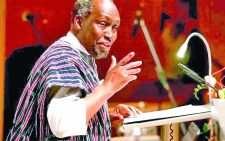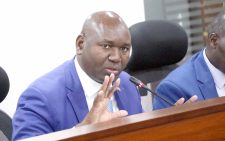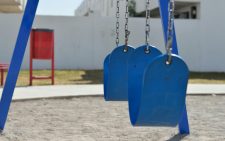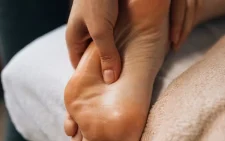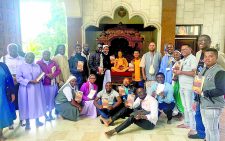Apparel star who rose from the slums
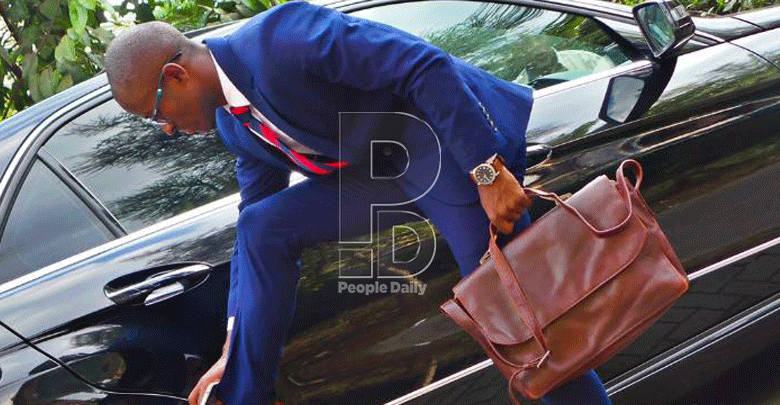
At first glance, the charisma and vibrance in his countenance don’t exactly tell the full story of Webstar Ireri.
Neither does his neck-turning dapperness in the well-fitting white pair of shorts paired with an enviable crisp black blazer that neatly clings to his form.
But this apparel company founder and lead designer at ‘Webstars Tailored’ understands what it means to emerge from the depths of poverty to a thriving business owner.
Webstar recalls his childhood in Kawangware, where he was born and raised as that child grounded with love from his hardworking mother and grandparentsd.
Life in the slums of Nairobi was economically unforgiving. The only thing he could be abundantly spoiled with while growing up was love.
He wore his first pair of shoes at seven years, which he received from Compassion International, a foreign organisation that swooped in to sponsor his education.
“With all the hardships, I knew the only way out for me was education. I pushed hard and excelled academically.
I wanted to be an economist from the get go. I wanted to deal with money. We were so poor that I just wanted to be around money,” he says.
Though he proved an apt student, the pressures of fighting to step out of destitution and expand his world tempted him to quit school for football.
He started playing football at a young age, which kept him centred and out of trouble.
With time, he became good at it and the meagre shine of the cash he earned from it almost beguiled him into giving up school.
Humble beginnings
“I’m glad I didn’t take that route. Out of the 10 people whom I was playing with, only two successfully made it as professional footballers.
Very few play for local big teams or make money out of it,” he shares.
Without a father, his mother was the sole breadwinner and caregiver. To raise her son, she had to work long hours.
Thankfully, his grandparents stepped in to care for Webstar and within no time, he started referring to his grandmother as ‘mother’.
He was the only child for a long time until his baby sister, who is in Class Eight, came along years later.
He peered beyond the confines of the city for the first time when he enrolled at Moi University in 2012, in Eldoret, for a bachelor’s degree in economics.
In his third year of college, Webstar secured an internship at Java House Africa, which translated into a paying job.
Being in his early 20s and making a decent salary, he decided to venture into second-hand clothes trading alongside his day job.
He would dash to Gikomba market in the crack of dawn to get his stock of clothes for sale and make it back in time for work.
Webstar wanted to keep his job, but had to return to college when he couldn’t secure a transfer to a Nairobi campus. He reluctantly resigned from his job to pursue his final undergraduate year.
After his studies, Webstar tried to re-enter the second-hand clothes trading business, but it wasn’t cutting it.
The market was inundated with traders and there was no promising future in it. At this point, the allure of suits had been incessantly tagging at him.
“Coming from a poor background, I realised dressing the part was important no matter my circumstances.
Looking good not only boosts confidence, but could be what gets someone through a door and maybe getting through that door could lead you to your next big opportunity on the other side,” he says.
Taking off
To make these suits, he needed the skills for it. So, he took a gamble, which his mother wasn’t so pleased with, but supported him regardless.
“I convinced her to give me a year to try tailoring and if it didn’t work, I would get a job.
I wanted to learn the design aspect and all the processes required to understand the suit-making and selling business,” he shares.
Webstar enrolled into a tailoring school in 2016 and upon graduating, he made his first three suits, which he says were hideous, but, a step toward Webstars Tailored, which is now heading into its fourth year.
The next five suits were an upgrade. He wore them every day, Monday to Friday, to market them.
And it worked. Soon, people were not only curious as to where he was getting the suits, but making orders too.
That’s how his business took off and still stands despite the disruptive effect it has endured from the pandemic. He initially couldn’t afford tailoring machines and had to outsource the services.
The business gradually grew to a point where he could lease office space for a few days in a month, to handle appointments.
“I bundled all my appointments into single day to cut costs. I would go early, set up the space, and attend to my clients then pay a fee for that day. It feels nice to have my own space now and be able to sustain it,” says Webstar.
He now has his own tailoring machines and a dedicated team he works with. “My job is patterning the fabric and cutting it based on clients’ measurements.
I leave the rest of the job to the tailors. Nowadays, I don’t sit down behind the machine a lot, but I have one at home just in case urgent business arises when I’m there,” he says.
With an efficient team, Webstar is able to deliver on his clients’ expectations, but he still finds it challenging to delegate.
Not that he doesn’t trust his team, but he wants to ensure customer satisfaction and wants his brand to present the image he envisions.
“The moment someone walks out of that door with our suits, they are taking our name out there and it will speak a lot. It’s more about that and the client than it is about money,” he says.
While he didn’t see it initially, having a background in economics has greatly contributed to building a strong backbone for his business.
“It has helped me manage the business better in terms of planning and the financial side of it. Economics is about solving problems with the available resources.
My mind is tuned in a type of way that helps me think fast to either keep problems at bay or solve them.
The dream is to make Webstars Tailored a one-stop shop for everything a client would need from head to toe,” says Webstar.



